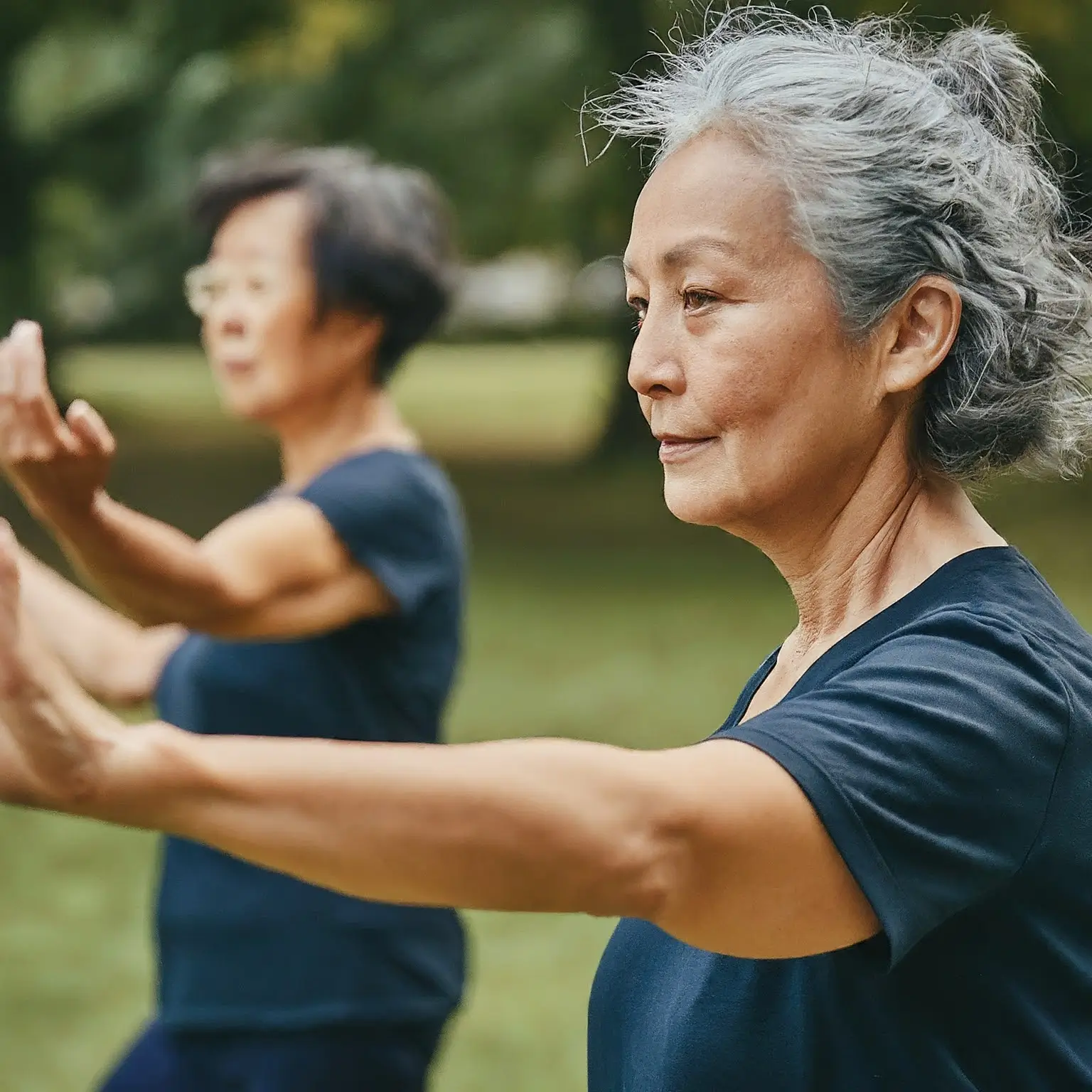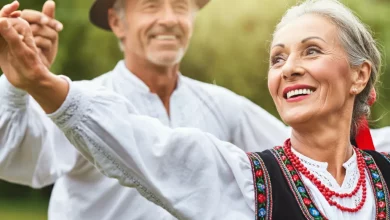Tai Chi for Seniors: Gentle Movements for Better Health

Introduction: Discovering the Gentle Power of Tai Chi
Did you know that a 2,000-year-old Chinese practice could be the key to improving your health and well-being in your golden years? Welcome to the world of Tai Chi, a gentle yet powerful form of exercise that’s gaining popularity among seniors across the globe.
Imagine a group of older adults moving slowly and gracefully in a park, their movements flowing like water. This is Tai Chi in action, and it’s not just a beautiful sight – it’s a path to better health. Recent studies have shown that regular Tai Chi practice can reduce the risk of falls in older adults by up to 43%!
In this article, we’ll explore how Tai Chi can help seniors harmonize their health through gentle movement classes. Whether you’re looking to improve your balance, reduce stress, or simply find a new way to stay active, Tai Chi might be the perfect solution for you.
What is Tai Chi?
Tai Chi, pronounced “tie-chee,” is an ancient Chinese practice that combines slow, flowing movements with deep breathing and meditation. It’s often described as “meditation in motion” because it promotes a sense of inner calm while gently exercising the body.
Originally developed as a martial art, Tai Chi has evolved into a popular form of exercise that focuses on:
- Balance and coordination
- Flexibility and strength
- Mindfulness and relaxation
Unlike high-impact exercises that can be hard on aging joints, Tai Chi offers a gentle, low-impact alternative that’s perfect for seniors. It doesn’t require any special equipment, and you can practice it almost anywhere – indoors or outdoors, alone or in a group.
The Health Benefits of Tai Chi for Seniors
The gentle nature of Tai Chi might make you wonder: “Can it really improve my health?” The answer is a resounding yes! Research has shown that Tai Chi offers numerous benefits for seniors, including:
- Improved balance and reduced fall risk: A study published in the Journal of the American Geriatrics Society found that Tai Chi practice reduced falls in older adults by 43%.
- Enhanced flexibility and mobility: Regular practice can help keep your joints limber and improve overall range of motion.
- Stress reduction and mental health benefits: Tai Chi’s meditative aspects can help reduce anxiety and improve mood.
- Cardiovascular health improvements: Even though it’s low-impact, Tai Chi can provide a moderate aerobic workout, benefiting heart health.
- Pain management: Many seniors find relief from chronic pain conditions through regular Tai Chi practice.
These benefits make Tai Chi an excellent choice for seniors looking to improve their overall health and well-being. In the next section, we’ll discuss how to get started with Tai Chi and what seniors should know before beginning their practice.
Getting Started with Tai Chi: What Seniors Should Know
Embarking on your Tai Chi journey can be an exciting step towards better health. Here’s what you need to know to get started:
- Consult your healthcare provider: Before beginning any new exercise regimen, it’s crucial to check with your doctor. They can advise you on any precautions you should take based on your individual health status.
- Choose the right style: There are several styles of Tai Chi, but the Yang style is often recommended for seniors due to its gentler, slower movements. It’s an excellent choice for beginners and those with limited mobility.
- Dress comfortably: Wear loose, comfortable clothing that allows for easy movement. Flat, flexible shoes with good traction are ideal.
- Set realistic expectations: Remember, Tai Chi is about the journey, not the destination. Start slowly and be patient with yourself as you learn.
Finding Tai Chi Classes for Seniors
Once you’re ready to start, the next step is finding the right class. Here are some options to consider:
- In-person classes: Many community centers, senior centers, and gyms offer Tai Chi classes specifically for seniors.
- Online classes: If you prefer to learn from home, there are numerous online options available.
- Group vs. individual lessons: Decide whether you’d prefer the social aspect of group classes or the personalized attention of private lessons.
When choosing an instructor, look for someone who:
- Has experience teaching seniors
- Is certified by a reputable Tai Chi organization
- Understands and can accommodate any physical limitations you may have
Don’t hesitate to ask questions before joining a class. Some good questions include:
- What style of Tai Chi do you teach?
- How long have you been teaching seniors?
- Can you modify movements for people with limited mobility?
A Typical Tai Chi Class for Seniors
Knowing what to expect can help ease any nervousness about your first class. Here’s a general structure of a typical Tai Chi session:
- Warm-up: Gentle stretches to prepare your body for movement
- Instruction: Learning and practicing specific Tai Chi movements
- Form practice: Putting the movements together in a flowing sequence
- Cool-down: Gentle stretches to relax your muscles
Some basic movements you might learn include:
- Wave Hands Like Clouds: A flowing arm movement that improves upper body flexibility
- Brush Knee: A stepping movement that enhances balance and leg strength
- Part the Wild Horse’s Mane: A coordinated arm and leg movement that improves overall body awareness
Remember, proper breathing is a crucial part of Tai Chi. You’ll learn to coordinate your breath with your movements, promoting relaxation and focus.
Incorporating Tai Chi into Daily Life
The beauty of Tai Chi lies in its versatility. You can easily incorporate its principles into your daily routine. Here are some simple exercises you can do at home:
- Standing Meditation: Stand with feet shoulder-width apart, knees slightly bent. Take deep, slow breaths for 5-10 minutes.
- Arm Circles: Slowly rotate your arms in large circles, coordinating with your breath.
- Tai Chi Walking: Take slow, deliberate steps, focusing on your balance and breathing.
For optimal benefits, aim to practice Tai Chi for 15-20 minutes daily. Remember, consistency is key! You can also combine Tai Chi with other senior-friendly activities like walking or swimming for a well-rounded fitness routine.
Success Stories: Seniors Thriving with Tai Chi
Many seniors have found renewed vitality through Tai Chi. Take Margaret, 72, who started Tai Chi after a hip replacement. “I was worried about falling, but after six months of Tai Chi, my balance has improved tremendously. I feel more confident and energetic!”
Or consider Robert, 68, who turned to Tai Chi to manage his stress and high blood pressure. “It’s amazing how something so gentle can have such a powerful impact. My doctor is thrilled with my progress!”
These stories highlight the diverse benefits Tai Chi can offer, regardless of your starting point or specific health concerns.
Overcoming Common Concerns and Misconceptions
It’s natural to have some hesitations about trying something new. Let’s address some common concerns:
- “I’m not flexible enough”: Tai Chi is about improving flexibility, not being perfectly flexible from the start.
- “It looks too complicated”: Classes are designed to teach you gradually. You’ll start with basic movements and progress at your own pace.
- “I have physical limitations”: A good instructor can modify movements to accommodate various physical conditions.
Remember, Tai Chi is adaptable to all fitness levels. It’s not about perfection, but about improving your health and well-being step by step.
Conclusion: Your Journey to Harmony Begins Here
Tai Chi offers a gentle yet effective path to better health for seniors. From improved balance and flexibility to stress reduction and pain management, its benefits are wide-ranging and well-documented.
By incorporating Tai Chi into your life, you’re not just exercising your body – you’re nurturing your mind and spirit as well. It’s a holistic approach to health that can enhance your overall quality of life.
So why not give it a try? Look for a Tai Chi class in your area or explore online options. Remember, every journey begins with a single step – or in this case, a single, mindful movement.
Are you ready to harmonize your health with Tai Chi? Your body and mind will thank you for it!



